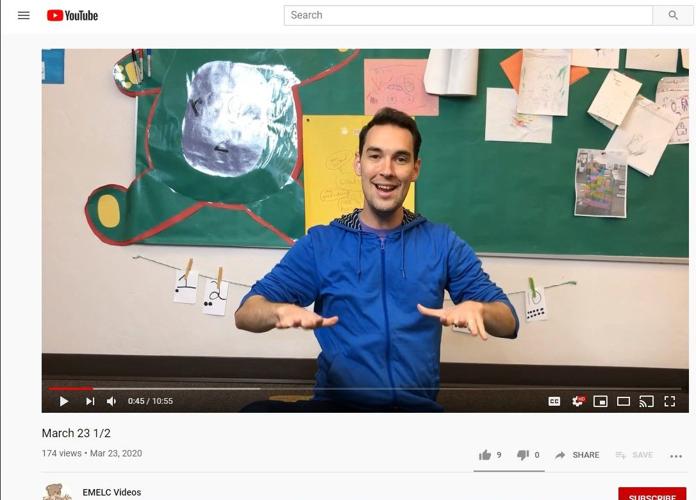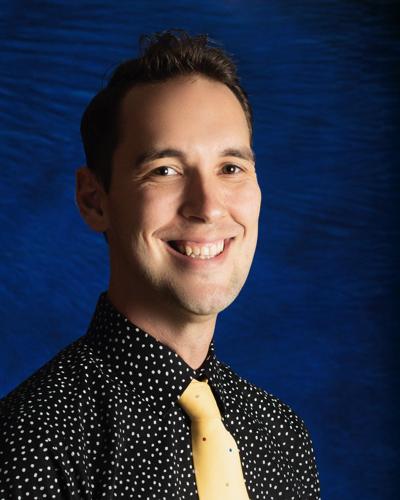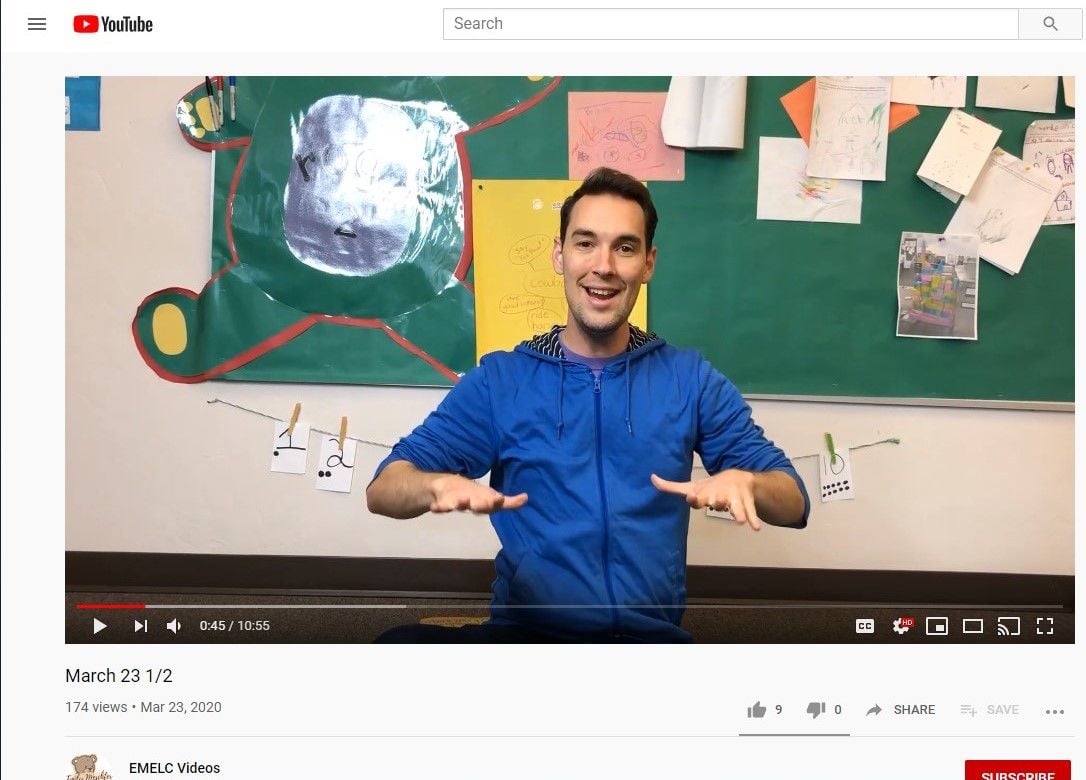Arizona Gov. Doug Ducey and State Superintendent of Public Instruction Kathy Hoffman first announced March 15 that schools would be closed short-term and then a final announcement came on March 30 that schools would be closed for the remainder of the semester.
Many Tucson students returned to the classroom in late March in little digital squares on Zoom and other video conference platforms from their homes, the first time they've seen their teachers and classmates in weeks.
For those with internet access, they log on to their schools' learning portals and complete tasks virtually, others complete assignments from work packets or books prepared by their district or teachers. This is what school looks like for the rest of the school year during the coronavirus pandemic — completely new territory for many students and their teachers.
We spoke with three local teachers for a series about their experiences so far.
This is the second installment.
Read the first profile of fourth grade teacher Tia Tsosie-Begay, and the third profile of high school teacher Kasie Betten.
Mister Ben teaches pre-K at Emily Meschter Early Learning Center
Mister Ben has two dogs, four cats, two guinea pigs and two chickens. He also has lots of socks with unique patterns: argyle, bicycles, stripes, flowers.
These are the kinds of fun facts you learn about a teacher when they’re making learning videos from home with pets roaming in the background and using the supplies at hand for an activity.
Mister Ben, whose full name is Benjamin Collinsworth, teaches pre-K at Emily Meschter Early Learning Center in the Flowing Wells Unified School District and he’s a 2020 Arizona Educational Foundation Ambassador for Excellence, which means he's among the top five teachers of the year in the state as selected by the organization.
On March 18, three days after the first round of school closures were announced, Mister Ben uploaded a quick video to the school’s Facebook page of himself in his living room showing a memory game that parents and kids could play together at home using different pairs of socks. It was a brief break from the real-life waiting game he was experiencing while awaiting further directions about how learning would continue from school and district leadership who were still working out those details.
“I remember those first three days ... it felt sort of like a free-for-all and we were all sort of untethered and wondering if we should go into school, if we should be gathering things or what the deal was going to be,” he says. “At that point a few of us were making our own videos and posting them. For me it was sort of a way of lightening the mood. I made a quick video in my living room about a sock matching game and thinking, alright, at least this is going to maybe help keep some kids engaged or at least put some smiles on some faces.”
Tucson teachers received the news about school closures the same time as the rest of the state in a statewide announcement from Arizona Gov. Doug Ducey and State Superintendent of Public Instruction Kathy Hoffman on Sunday, March 15. Unlike other area school districts, Flowing Wells was not on spring break at the time of the announcement, so the need to connect with families was even more urgent.
Mister Ben went into school early Monday morning and began working the phones to check in with his students and their families.
"I called their phone numbers one by one, just to... make sure everybody had heard the announcement and wasn't planning on sending their kid on a school bus that wasn't coming or planning on coming into school that wasn't open," he says. "And I was asking them all if they had internet access, if they felt like they had enough food or resources in their house. Just seeing what we might need to provide."

Ben Collinsworth, known as Mister Ben, teaches pre-k at Emily Meschter Early Learning Center.
Preschool in a bag
Later that week, on Thursday, the school staff was called in for a meeting with the director and they all began brainstorming the best ways to provide opportunities for their families to continue learning from home.
"(We thought) well, if we create a YouTube channel that will get access available to most of our families and also we'll have the benefit of being globally available to any families anywhere that are seeking resources," he says. "Which is something I had never done so it was a learning experience for me."
The teachers already had lesson plans ready to go, so figured in lieu of teaching the lessons in the classroom, they'd record videos of themselves teaching them on YouTube.
They also knew that since not all families have access to the internet, they would have to put together packets and resources for those families too and quickly realized that it would be best for all families to have hands-on materials.
"Other teachers that I work with, I really got to see them be so strong and capable in the face of not just adversity but uncertainty, and they were just like coming up with such fast ideas that were really strong," Collinsworth says.
The result? Preschool in a bag.
The teachers began gathering all the essential preschool supplies that kids would need to participate in the YouTube lessons or the work packets, things like scissors, glue sticks, paper, crayons, snacks. They also made a step-by-step guide for parents to help them teach activities that matched the YouTube lessons and included other resources like vocabulary words and manipulatives they would need for each lesson.
"We also had our special education services like speech and occupational therapy putting together packets that we could also put in a bag that specific kids were going to get so they could continue to have their services being delivered at home," Collinsworth says.
They checked in with families to see who could pick up the bags at the school and who needed them to be delivered by the district's transportation department.
"That was a cool thing to see that the district as a whole was finding creative ways to keep all the departments active," Collinsworth says.
The team worked quickly to get that first round of materials out to families so they would have enough learning resources for about a week, but soon realized they would have to pivot again.
As the days passed and other cities and states began to have shelter-in-place orders issued, the staff knew it would be best for everyone to stay at home as much as possible, which meant limiting their own trips to the school and limiting the trips that families would need to make to pick up materials. They decided that for the following weeks it would be best to put their lesson plans online and continue to check in with families who didn't have access to the internet by phone on a daily or weekly basis to see how they could best support them.
"I sort of had the epiphany as soon as we started doing this that taking an academic approach to the instruction as sort of like the first step, really wasn't necessary or best practice anymore because we've all entered into not just a new sort of educational framework, but a new way of existing as a community, and that really needed to just be our focus," Collinsworth says.
"That was an interesting shift to have within my own mindset and it's still sort of at odds with what seems to be going on in the district and sort of in public education in the state overall because they're still wanting teachers... to be rigorous and providing instruction at almost the same level that we would have been in the classroom," he says. "Just because there is a worry that when the smoke clears all of this it would look like we weren't doing enough, and that we could become liable for not providing the things that we as public educators are supposed to provide."
Parents are the first and most important teachers in a kid's life
Collinsworth acknowledges that the expectation of educating children from home in addition to balancing working from home or other responsibilities is an added challenge for parents and encourages families to allow themselves some grace during this time.
He says he's made sure that his families know that the resources the teachers are putting together are there for if and when they need something to engage their child, and making clear they are opportunities and not assignments.
"I really think families.. should be relaxing expectations on what they should be doing and even relaxing that expectation on themselves to be home educators, especially parents of young children," Collinsworth says. "We tell them all the time and highlight their role all the time as their child's first and most important and most impactful teacher, that's just a given of life. Having a young child in your home environment and raising them as part of your family involves so much teaching just by itself and I definitely think it's OK and I'm encouraging parents who are at home with their kids to focus on that role as an educator. But at the same time my job, that I am fortunate enough to still be getting paid to do, is to provide instructional content. I'm working really hard to provide a fraction of that because I'm in a new environment, and doing it all from my home, but I'm providing it to say this is a resource that's now available to you if and when you need it."
The Flowing Wells district is on its spring break this week and Collinsworth hopes that when the break is over and in the coming weeks he'll be able to connect with the kids he hasn't yet heard from and establish some normalcy with his students by interacting with more of them on a regular basis through weekly Zoom read-alouds and music and movement sessions, something he tested out last week as he was learning the technology.
"If I'm being honest that was something that I did for me because I personally was missing those kids and their families and it was an opportunity for me to be able to see some of them, see some of their faces and hear some of their voices," he says.
"I'm taking a lot of time to remember this is not, specifically, an educational crisis. It's a global health crisis that everybody is affected by. And I'm hoping that all the measures that we are all taking have the effect that we're hoping for," he says hoping that there is a chance later in the summer for the school to host its annual end-of-year performance and he can see his students in person before they head to kindergarten. "So I'm hoping for a synthetic normalcy for now and a real one for later."






